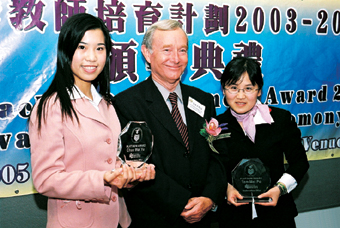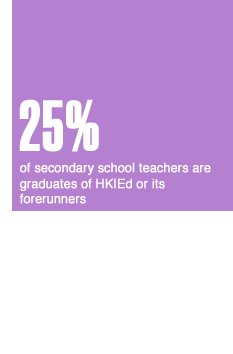 |
 |
|
|
 |
 |
 |
 |
 |
 |
 |
 |
 |
 |
 |
 |
 |
 |
 |
 |
Our students being nurtured
into becoming professional, caring and responsible
teachers of tomorrow. |
 |
Two HKIEd graduates won full
scholarships from the University of Northern
Iowa for their academic excellence and well-rounded
personalities.
|
 |
|
 |
 |
 |
 |
 |
 |
 |
 |
 |
 |
|
 |
 |
 |
 |
 |
 |
 |
Within the fast-changing
landscape in the provision of higher education in
Hong Kong, the Institute has been actively fulfilling
its role as a fully-fledged tertiary institution,
dedicated to nurturing knowledgeable, caring and responsible
educators. Following its in-depth collaboration with
the Chinese University of Hong Kong (CUHK), the implementation
of a new academic structure as well as the introduction
of professorial titles, the Institute is ideally placed
to move forward with optimism.
HKIEd's Collaboration with Local
and
Overseas Institutions
The Institute has developed over the years collaborative
programmes with different institutions, both locally
and internationally. The collaborations involve student
and staff exchanges and the sharing of knowledge and
materials. The collaborations that the Institute entered
into with the Hong Kong University of Science and Technology
and Lingnan University on science and humanities related
disciplines are some of the outstanding examples. Such
collaborative models help advance the pursuit of excellence
in scholarship for the benefit of our student teachers
and the community as a whole. Thus far, the Institute
has signed academic collaborative agreements with four
local institutions and 29 mainland and overseas institutions.
|
 |
 |
 |
Deep
collaboration with CUHK
HKIEd is widely recognised as the leader in kindergarten
and primary teacher education in Hong Kong. Capitalising
on these strengths while expanding into new areas of
service, the Institute has been exploring opportunities
to collaborate with other tertiary institutions. These
efforts came to fruition during the year, when an agreement
was signed on 9 July 2005 between Professor Paul Morris,
President of the HKIEd and Professor Lawrence J Lau,
Vice-Chancellor of CUHK, to pursue an in-depth collaboration
between the two institutions. With their combined strengths,
the close collaboration will create synergies and facilitate
cross-fertilisation, enhancing the quality of education
and the teaching profession throughout Hong Kong. It
will also enhance the performance of both institutions
in their respective roles, and ensure that as partners,
they will take the leading position in teacher education
in Hong Kong. This deep collaboration will also play
a significant role in education across the Asia-Pacific
region, contributing to Hong Kong's role as a regional
hub for higher education.
|
 |
 |
|
An agreement on deep collaboration
was signed by Professor Paul Morris, President
of HKIEd (right) and Professor Lawrence
J Lau,
Vice-Chancellor of CUHK, on 9 July 2005.
|
|
In setting up this
collaboration, a guiding principle has been to acknowledge,
recognise and respect the differences in the missions,
roles and traditions of both institutions. At the same
time, committed to the academic and professional enhancement
of teacher education in Hong Kong and the region, the
collaboration is not intended to save resources in any
way. Ensuring the best way forward, the Institute and
CUHK have appointed a joint Task Force, at vice-presidential
level, to draw up mid to long term strategies and plans.
The Institute is also determined that staff and students
will be well-informed and consulted throughout the process.
Adhering to the guiding principles, the Task Force will
explore opportunities for the collaboration in its future
discussions, with a focus on the coming two triennia,
2005-2008 and 2008-2011.
Meanwhile the University Grants Committee (UGC) has
assured the two institutions that resources devoted
to teacher education for each institution will be preserved.
It has also reaffirmed its willingness to consider,
at an appropriate time, a joint submission from both
institutions seeking additional financial support under
the collaborative initiative, in this and / or the next
triennium. |
 |
 |
 |
 |
 |
|
| |
|
 |
 |
|
 |